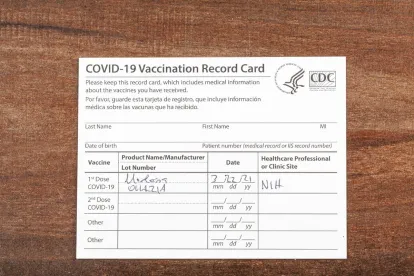On September 9, 2021, President Biden announced a plan to require all private employers with one hundred (100) or more employees to ensure that their workers are fully vaccinated against COVID-19, or produce a negative COVID-19 test each week. This vaccine mandate, part of a larger effort designed to require more than 100 million Americans to get vaccinated, will be implemented through an Emergency Temporary Standard (ETS) to be issued by the U.S. Department of Labor’s Occupational Safety and Health Administration (OSHA).
To date, OSHA has not released draft regulations, though they are expected within the coming weeks. Once released, it is not clear when the mandate will take effect, but employers may be left with a very tight timeframe to come into compliance.
Expected Legal Challenges
While many have praised the vaccine mandate as a necessary measure to curb the rampant spread of COVID-19 and the dangerous Delta variant, some view the mandate as an overreach of executive authority.
While we expect to see challenges to the vaccine mandate on constitutional grounds, we also anticipate that the challenges may be largely unsuccessful. Federal courts have routinely rejected constitutional challenges to vaccine mandates, provided that they are not discriminatory in nature. In fact, since the 1905 Supreme Court case Jacobson v. Massachusetts, courts have held that compulsory vaccination laws are not inconsistent with the tenets of the Constitution.
A stronger challenge to President Biden’s vaccine mandate concerns the validity of the ETS itself. Since its inception, OSHA has only issued ten (10) emergency standards, with varying levels of legal success, leaving the anticipated ETS vulnerable to legal challenge for a lack of precedent. In addition, OSHA is tasked with regulating workplace safety on a national level. If the vaccine mandate is not carefully tailored to address a clear national workplace safety risk, there could be grounds to invalidate the rule. Indeed, some argue that OSHA has no standing to enact a nationwide vaccine mandate where spikes in COVID-19 cases have varied considerably by region.
In any case, the forthcoming ETS is sure to be met with fierce legal challenges from state governments and private businesses alike. The attorney general of Arizona has already filed a lawsuit in an effort to prevent the vaccine mandate from taking effect, and attorney generals and governors from New Hampshire and South Dakota have promised similar legal action.
How to Prepare for What Lies Ahead
All this to say that businesses are understandably struggling with the decision of if/when/how they should roll out a vaccine mandate and testing requirements. The following are action items that employers with one hundred (100) or more employees should consider taking now:
-
Create a vaccination policy. Do not wait to act until OSHA issues the ETS; prepare a vaccination policy that complies with the anticipated OSHA mandate, i.e., require your employees to provide proof that they are fully vaccinated, or require them to submit to weekly testing. Despite the anticipated legal challenges, the OSHA regulations could become effective almost immediately after they are announced, and you want to be prepared. Legal challenges to the mandate will take time to litigate, and in the meantime, businesses that don’t comply with the mandate could face fines of up to $14,000 or more.
-
Prepare to collect vaccination information. Ensure that you have policies and practices in place to request, collect, and confidentially maintain records of employees’ vaccination status. Designate a contact person or small team to whom employees should provide evidence of their vaccination status (e.g., a copy of their vaccination card). Remember that vaccination status constitutes confidential medical information and must be maintained confidentially and securely, separate from an employee’s personnel file.
-
Prepare to roll out mandatory testing. Understanding that unvaccinated employees will have to produce a weekly negative test result as a condition of continued employment, begin consider what your testing policy will look like. Will you offer on-site testing for employees, allow them to self-administer tests at home, or send them to a third-party location? Consider the applicable wage and hour laws in your state and local municipality and be sure to compensate employees for time spent receiving a test where it is required by law. In addition, prepare policies and infrastructure for collecting weekly test results from unvaccinated employee – will you use an app that tracks test results or identify a team to receive and review test results?
-
Consider a mandatory vaccine policy. Although the ETS will offer employees with the choice to provide proof of vaccination status or submit to testing, keep in mind that in most locations, businesses can go further and simply mandate vaccines for all employees. To that end, determine whether, given the new ETS, it is in your company’s interest to mandate vaccines in general and forego the testing option. To make this determination, review factors such as impact on workforce morale and retention, and the administrative, time, and potential financial costs of overseeing a program involving multiple weekly tests.
-
Prepare to receive accommodation requests. Employers must provide reasonable accommodations, absent undue hardship or a direct threat to the health and safety of others, to qualified individuals that enable them to perform their essential job duties. Employers must also provide reasonable accommodations, absent undue hardship, to employees with sincerely held religious beliefs, observances, or practices that conflict with getting vaccinated. Be prepared to address questions about accommodations by having standard forms and established processes for collecting and reviewing requests.
-
Confer with your Foley attorney. As you process these considerations and begin to roll-out vaccination policies, reach out to your Foley Labor & Employment counsel with questions and to ensure compliance with federal and state law.




 />i
/>i

